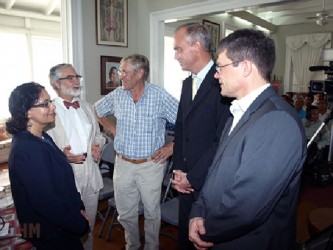A key outcome of a recently completed three-day training workshop was the recommendation from participants that Guyana should accede to the Nagoya Protocol, an international legal instrument which covers access to genetic resources and fair and equitable benefit sharing.
A release from the Justice Institute Guyana said that the workshop for key stakeholders focused on the importance of conserving biological diversity and how to obtain a fair share of the benefits from granting access to genetic resources and traditional knowledge.
A key element of the workshop was to raise awareness of the Nagoya Protocol which is a supplementary agreement to the Convention

on Biological Diversity on access to genetic resources and the fair and equitable sharing of benefits arising from their utilisation (ABS). The Protocol sets out standards that persons can use in their dealings with researchers and anyone who wants to have access to genetic resources or traditional knowledge.
The event was launched at Moray House by Ambassador Robert Kopecký of the European Union Delegation, Deputy Head of Mission of the German Embassy in Trinidad and Tobago, Ullrich Kinne and Dr Hartmut Meyer of the ABS Initiative. Also present were the Mexican Ambassador, Francisco Olguín Uribe, and the German consul Ben ter Welle.
The workshop was hosted by the Justice Institute with the support of the ABS Capacity Development Initiative, a multi-donor initiative implemented by GIZ, the German Society for International Cooperation (Deutsche Gesellschaft für Internationale Zusammenarbeit).
At the launch on December 3, Ambassador Kopecký informed the gathering that the European Union fully supports the Access and Benefit Sharing/Nagoya Protocol initiative and noted that the Protocol was positively voted on by the European Parliament on September 12, 2013 and was awaiting final ratification by the European Council of Ministers. He further said that “the European Union believes that populations owning the genetic resources, including indigenous groups, are likely to reward countries and companies which seek to protect their biodiversity and intellectual property rights.”
He assured that “the EU and its member states are committed to becoming parties to the Protocol to secure access of EU researchers and companies to quality samples of genetic resources, based on reliable access decisions at low transaction costs. This will create new opportunities for nature-based research and contribute to the development of a bio-based economy.”
Ambassador Kopecký also observed that “as there is an abundance of both knowledge and wealth in Guyana, this initiative will help Guyanese citizens protect and transform that knowledge and wealth.”
Executive Director of the Justice Institute, Melinda Janki stated, “Guyana is extremely rich in biodiversity. Conservation of this biodiversity is essential for our future and the future of our children and grandchildren. The Nagoya Protocol is important because it sets standards for access to genetic resources and a fair share in the benefits. It’s not what you have that makes a country rich, but how intelligently you use what you have. We must liberate ourselves from our outdated wasteful consumer culture and develop a modern green economy.”
Presentations covered the importance of conserving biodiversity, the intrinsic value of biodiversity; traditional knowledge; research, free, prior, informed consent, and the legal regime.
The release said that Guyana has a rich heritage of traditional healing, popularly known as “bush medicine” and based on traditional Amerindian, African and Indian medicine. Following the success of this pilot event, the Justice Institute has been asked to conduct more training on access and benefit sharing. The Justice Institute hopes to develop a more comprehensive programme on the Nagoya Protocol that can reach all holders of traditional knowledge.
It said that although Guyana has not yet acceded to the Nagoya Protocol, traditional knowledge holders can still adopt its principles and standards to protect themselves in their dealings with other people.
The Justice Institute said that the level of education varied widely among participants from basic nursery school to university doctorates. The impact of the training was evaluated by a qualified anthropologist. Despite the differences in education levels, the data showed a marked increase across the participants in understanding the issues relating to access and benefit sharing.
An Amerindian toshao was quoted as saying, “I am better able to protect my community from exploitation.” This is an important development as Amerindian communities are the biggest private landowners in Guyana and the custodians of rich biodiversity.
The Justice Institute explained that the Amerindian Act 2006 gives Amerindian communities control over access to this biodiversity and control over the use of their traditional knowledge. Although the Amerindian Act 2006 predates the Nagoya Protocol by four years, it already requires free, prior, informed consent as well as fair and equitable sharing. However Amerindians have not yet been able to use their resources and legal powers to build prosperous communities.
According to the release, participants described the event as “well-organised, exciting and encouraging.” Another important outcome of the event was the commitment by participants to work with the Environmental Protection Agency (EPA) in order to develop the right approach in Guyana for access and benefit sharing. The EPA is the lead agency for the Convention on Biological Diversity and the Nagoya Protocol.
The participants in the training came from every region in Guyana and included representatives of the EPA, Guyana Forestry Commission, Guyana Geology and Mines Commission, Women and Gender Equality Commission, Rights of the Child Commission, the Guyana representative to the United Nations Permanent Forum on Indigenous Issues, the University of Guyana, National Trust, Executive Committee of the National Toshaos Council, additional toshaos from Region 2 and Region 9, Iwokrama, Guyana Amazon Tropical Birds Society, North Rupununi District Development Board, Conservation International, Sydney Allicock MP, teachers and lawyers. Caricom was also represented.





